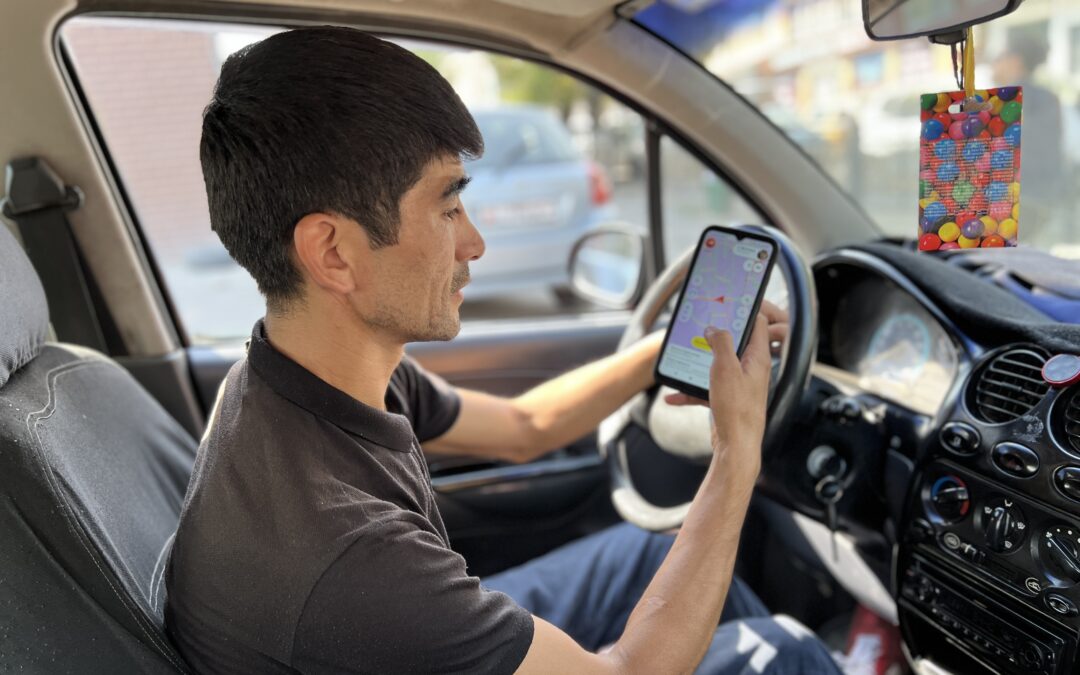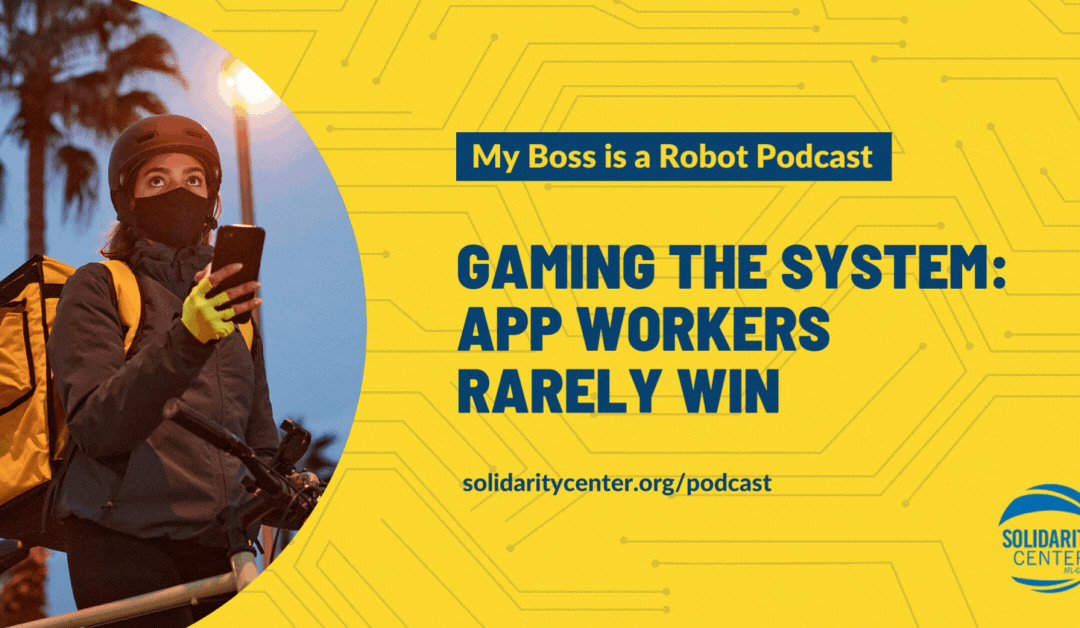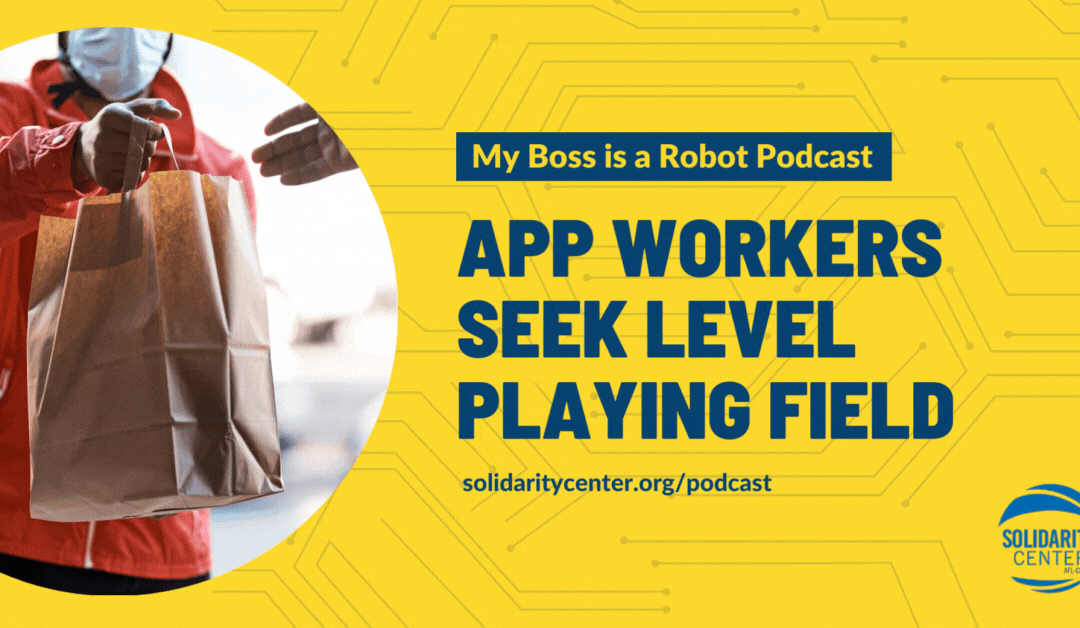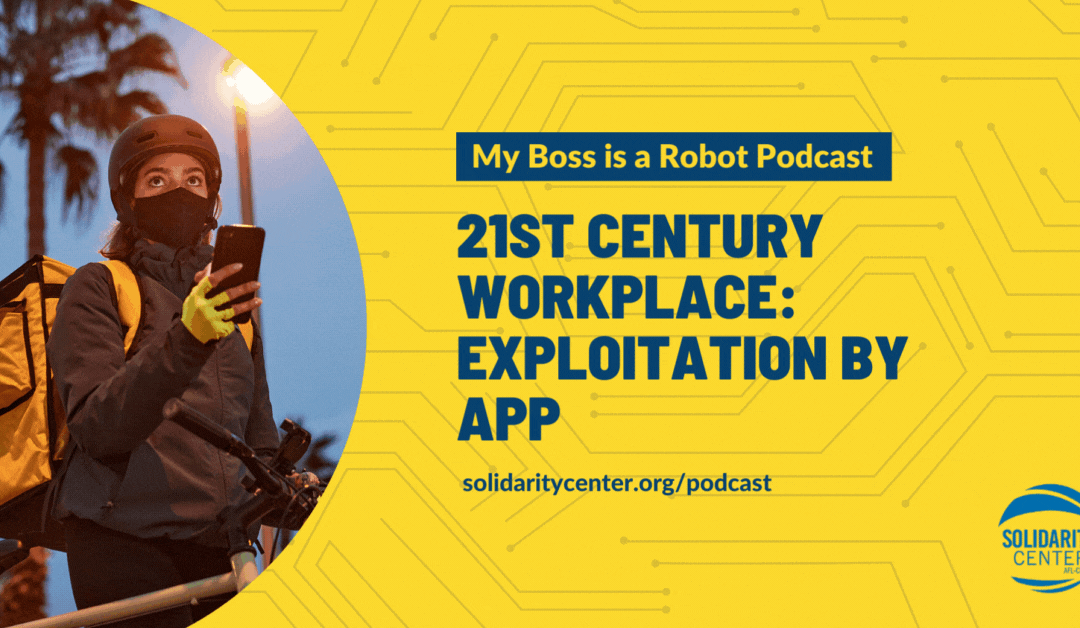
Oct 3, 2023
App-based drivers in Osh, Kyrgyzstan, achieved a historic milestone by negotiating a first collective bargaining agreement with a leading platform-based transportation company, Osh Taxi.
The September 29 pact, negotiated by the Kabylan union, extends beyond union members to cover all 2,000 drivers in the taxi fleet. It provides strong safety and health protections, including prevention of gender-based violence and harassment, and protects drivers’ rights against labor violations like unjust employer fines.
“The signing of the collective agreement is a highly important event that signifies a pivotal moment in our union’s history since its establishment,” says Kabylan President Ulan Cholponbaev. “This agreement has set an outstanding precedent for labor relations between taxi companies and workers, serving as a valuable tool for safeguarding the labor rights of drivers.”
App-based drivers started mobilizing several years ago to get the same rights and protections as workers covered by Kyrgyz law, and recently formed the Kabylan union, which now has 3,000 members.
The agreement also covers such areas as unjust suspension of drivers on the platform and gender discrimination, and includes a comprehensive set of measures and policies aimed at creating a work environment free from harassment and violence.
“Our union brings improvements, not for us only, but for the next generation, too,” says driver and Kabylan member Gulmayram Batirbekova. A single mother of five, she has become an active leader in Kabylan, which she says is named after an animal “that is fiercely independent, a leader.”
Kabylan Expands Outreach
Drivers and their union began the process in March, and the contract followed formalization of a social partnership agreement between Kabylan and Osh Taxi. The foundational agreement laid the groundwork for negotiations that led to the comprehensive collective agreement.
Kabylan also provides legal assistance for taxi drivers in Osh, the country’s second largest city, and throughout the southern region, with the union’s lawyer holding more than 30 consultations on workers’ rights each month.
The union is getting set to sign a second collective agreement with CARS.KG, another prominent taxi company that employs 400 taxi drivers.
Although most countries have hard-won labor laws in place, app-based drivers and 2 billion informal sector workers have few legal protections. A new six-part Solidarity Center Podcast series, “My Boss Is a Robot,” takes you on a journey with app-based drivers as they navigate a system that is programmed to exploit workers in the global gig economy. Download it here or wherever you get your podcasts.

Sep 27, 2023
Food delivery and passenger service drivers and are forced to follow the company apps. But if apps miscalculate and send drivers in the wrong direction, or lower wages for drivers stuck in traffic, it’s the driver who loses wages, or is even booted from the platform. The latest episode of My Boss Is a Robot shows that for app-based companies, these are not bugs–they are built into an algorithmic system designed to move money from workers and into the pockets of the rich corporate bosses.
From Thailand, delivery driver Niap Chunti Ta Kai See Kun tells Podcast Host and Solidarity Center Executive Director Shawna Bader-Blau that the app often shows his destination far closer than it really is–sometimes indicating a route straight through buildings.
“The distance in the Google Map, for an example, is five kilometers, but the distance in the application map is always shorter, like three kilometers,” he says. “I think that’s not a mistake, they intend to do that because that will reduce the pay and that will reduce the cost for the application. The shorter the distance, the less they have to pay us. But the longer the distance, the more they have to pay us.”
Drivers also work long hours and rush between deliveries because if they don’t, the app punishes them by lowering pay.
“And that’s why you see some drivers died on the wheel,” says Lawal Ayobami, an app-based driver in Nigeria. “There was no rest for the driver. They don’t even go to their family. They’re on the road because they want to make money.”
Delivery Drivers Stand Up for Their Rights
Delivery drivers around the world are standing up for their rights: Earlier this year, Nigeria’s Ministry of Labor recognized the Amalgamated Union of App-Based Transport Workers of Nigeria after delivery drivers organized in cities across the country.
“That means workers like Ayobami will begin to get the protections and benefits they deserve in this highly unregulated and informal sector,” says Bader-Blau.
“My Boss Is a Robot” is a six-part series that seeks to shine a light on the behind-the-scenes practices of app companies who exploit workers in the global gig economy. Download the latest episode, Gaming the System: App Workers Rarely Win, and watch for the next episode on October 11.
Listen to this episode and all Solidarity Center episodes here or at Spotify, Amazon, Stitcher or wherever you subscribe to your favorite podcasts.

Sep 13, 2023
For many job seekers, joining the ranks of delivery drivers or other app-based workers is sold as entrepreneurship–a way to make money as an independent contractor and be their own boss. But the reality is much different, as workers from Africa to Latin America have found out.
“Just in Latin America, we see millions of [app-based] workers who are exploited, who are working injured, who don’t even have a minimum salary guaranteed, who are risking their life every day with no guarantees whatsoever because the company can terminate them if they deem that they’re not meeting certain standards,” says Mery Laura Perdomo, a lawyer for the International Lawyers Assisting Workers Network (ILAW), a Solidarity Center project.
Perdomo and other experts joined Solidarity Center Podcast Host Shawna Bader-Blau on App Workers Seek Level Playing Field, the second episode of “My Boss Is a Robot,” to discuss how delivery drivers and other app-based workers are excluded from basic labor protections because companies have classified them as “independent contractors”–all while enforcing rules and requirements as in a standard workplace.
But even as app companies around the world have waged multimillion dollar campaigns to prevent court decisions or legislation that would classify gig workers as employees, delivery drivers are standing up for their rights on the job.
Explore their battle for fair treatment as they seek to be recognized by companies as the employees they really are.
“My Boss Is a Robot” is a six-part series that seeks to shine a light on the behind-the-scenes practices of app companies who exploit workers in the global gig economy. Download the latest episode, App Workers Seek a Level Playing Field, and watch for the next episode on September 27.
Listen to this episode and all Solidarity Center episodes here or at Spotify, Amazon, Stitcher or wherever you subscribe to your favorite podcasts.

Sep 7, 2023
If you work seven days a week, 12 hours a day and don’t make enough money to pay the bills, you can talk to your boss, right? Not if your boss is an app.
“My Boss Is a Robot,” a new series on The Solidarity Center Podcast, explores the challenges delivery drivers around the world face as they navigate not only dangerous traffic but a workplace where algorithms arbitrarily determine wages, hours and working conditions.
In the first episode, “21st Century Workplace: Exploitation by App,” Solidarity Center Executive Director and podcast host Shawna Bader-Blau talks with Yuly Ramírez, a delivery driver in Ecuador, who worked for Uber and Glovo.
“We used to have a base salary of $1 per hour,” says Ramírez. “Our rates were cut down almost by half. We found out that we could not make nearly as much as we were making before, not even working 12 hours a day, seven days a week.”
The episode also features Arianna Jiménez, a scholar who interviewed app-based drivers in Colombia, most of whom are migrants seeking opportunities to support themselves and their families. Jiménez discusses the vast profits of delivery corporations like Rappi in Latin America, which bases its business model on workers forced to work harder for lower and lower wages.
“They’re gaining profit from all sides and maximum cost is transferred to the individual,” says Jiménez.
“Exponential growth without investment in its workforce,” says Bader-Blau. “And, recently, during the worst parts of the pandemic in Colombia, Rappi made its drivers compete for vaccines, if you can believe it.”
App-Based Exploitation Doesn’t Stop at the Border
As the series shows, app-based workers from Thailand to Colombia face the same exploitative working conditions, as a new form of Gilded Age workforce repression spreads globally.
But like the early industrial era, delivery drivers and other app-based workers are standing up for their rights. Across Latin America, for instance, workers have been staging organized protests as early as 2018, and in Nigeria, delivery drivers formed the country’s first union of app-based workers. The series will conclude with two episodes on worker organizing in this growing industry.
Download 21st Century Workplace: Exploitation by App and watch for the next episode on September 13.
Listen to this episode and all Solidarity Center episodes here or at Spotify, Amazon, Stitcher or wherever you subscribe to your favorite podcasts.

Aug 10, 2023
At the end of a day picking tea leaves under the July sun, women walk from the hilly fields down an embankment and into a muddy stream, fully clothed, to bathe before they return to their company-provided tin homes where they prepare dinner for their families.
The tea estate workers in Sreemangal, Bangladesh, say their work is much harsher now due to increased heat and more torrential rains. The changing climate also means that picking the daily quota of tea leaves, always difficult, is sometimes impossible. And when they cannot meet their quota, they are paid even less than their already meager wages.

Sreemati Bauri, a Bangladesh tea worker and union leader. Credit: Solidarity Center / Hasan Zobayer
“It often happens that in a heat wave, it’s a hardship to meet the daily quota [up to 25 kilos, 55 pounds] of tea leaves, and so they can’t make the daily wage of 170 taka ($1.55),” says Sreemati Bauri, a tea estate field supervisor and union leader.
“It’s already difficult to live with this little amount of money. If a worker can’t make their daily target, it’s difficult to survive. Due to the heat, it has become too hot for them to get their wage,” she said, speaking through an interpreter. Bauri, an executive member of the Jurivally Executive Committee, part of the Bangladesh Cha Sramik Union, supervises 300 women who walk long distances across tea fields each morning before they start picking leaves.
“The heat is more excessive than before,” says Sumon Kumar Tant, a field supervisor and union member. “They have to work under scorching sun. It’s as if they have to carry two times the burden—one the burden of tea leaves on their back, and the other, the weight of the heat.”
Better Working Conditions at Unionized Tea Estates

Bangladesh tea workers walk long distances across fields on their way to pick tea leaves. Credit: Solidarity Center / Gayatree Arun
“At higher temperatures and prolonged periods of exposure, heat stress can lead to exhaustion, it can lead to permanent disability, it can even lead to death,” says Sophy Fisher, discussing the findings of an International Labor Organization (ILO) report on the impact of heat stress on workers. And women are disproportionately affected by the impacts of rising heat due to the type of work they perform and physical issues such as pregnancy, according to a new study.
Climate change-related hardships add to tea workers’ already precarious working conditions. An estimated 13 million people in 48 countries work on tea plantations around the world, mostly women who are paid low wages and have few or no health and safety protections, including safeguards to prevent and address sexual harassment and other forms of gender-based violence. Tea plantation workers often are forced to rely on their employers for food, housing and education, adding to their vulnerability.
“Tea workers give a lot of sweat for their work,” says Bauri.
Workers in the Bangladesh Cha Sramik Union, a Solidarity Center partner, have achieved workplace improvements not offered at nonunion plantations, with employers required to provide daily hour-long lunch breaks and a medical facility. Tant cites the rapid benefit payment by a company to the family of a tea picker killed on the job by a falling tree branch as an example of how the union’s intervention ensured proper compensation.
Still, more progress must be made, he said, citing the need for pregnant workers to get more time off than the four months’ paid maternity leave granted under the country’s labor law.
Little Accountability Global Tea Supply Chain

Bangladesh tea worker, Sanchari. Credit: Solidarity Center / Hasan Zobayer
Rooted in colonial era exploitation, tea plantations are rife with worker rights abuses. Accountability in the global tea supply chain is particularly lacking, with a recent report finding few corporations willing to provide the information necessary to determine how workers are treated and little due diligence across the supply chain.
A lack of supply chain transparency means companies are not being held to account for violations, says Kate Jelly, author of the Business and Human Rights Research Center (BHRRC) report, Boiling Point: Strengthening Corporate Accountability in the Tea Industry. “Many companies maintaining opaque supply chains are able to distance themselves from human rights abuses,” she told Reuters.
Based on research into news stories from 2022, the report found human rights abuses in Bangladesh and four other countries involving low or unpaid wages, lack of safety and health protections, and employer intimidation of workers seeking to improve their workplaces through unions.
Involving workers in the due diligence process is essential for supply chain transparency, according to Natalie Swan, a BHRRC labor rights program manager. “That means not relying on certification, not relying on a human rights policy or a supplier code of conduct.”
Solidarity Center believes workers must be at the center of workplace solutions, including those involving climate justice, in which the needs of workers and their communities are involved in achieving a fair or just transition to a more equitable and sustainable economy to mitigate the impacts of climate change and enable adaptation for impacted communities.








